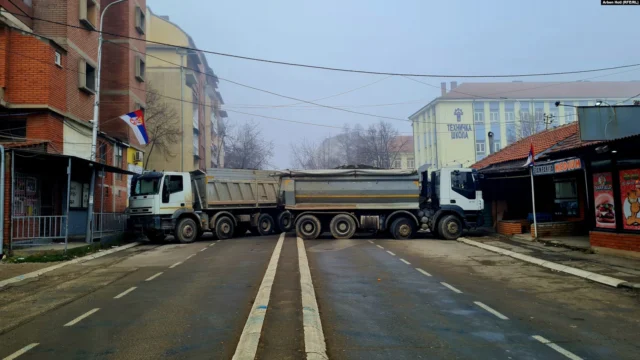More roadblocks were set up overnight in northern Kosova, where tensions have been running high in recent weeks between the government and gangs sponsored by Belgrade which rule the local ethnic Serbian community.
Kosovar police announced on December 27 that the two new roadblocks appeared in Mitrovica and in Zvecan.
“In the north of the country, during the night, criminal persons/groups have continued to set up consisting of heavy vehicles, further impeding the freedom of free movement,” police said to Radio Free Europe/Radio Liberty.
Kosova, which has an overwhelmingly ethnic Albanian majority, broke away from Serbia after a war in 1998-99.
It declared independence in 2008 and is recognized by 110 countries around the world, but not by Belgrade which continually encourages Kosova’s 120,000 ethnic Serbs to defy the central Kosovar government’s authority.
Northern Kosova has been especially on edge since November, when hundreds of Serbian workers embedded in the Kosova police as well as the judicial branch like judges and prosecutors walked off the job in protest at a controversial decision to ban Serbs living in Kosova from using Belgrade-issued license plates. Many employees have privately admitted to having resigned out of fear for their lives from the Serbian terrorist cells operating in the region.
The policy was scrapped by Prishtina but the mass walkouts created a security vacuum in Kosova.
On December 10, hundreds of ethnic Serbs, outraged over the arrest of an Serbian ex-police officer, set up roadblocks in northern Kosova and paralyzed traffic through two border crossings.
The roadblocks have been set up also amid a rise in reported shootings, the latest of which was occurred late on December 25, according to NATO-led peacekeeping force KFOR.
Late on December 26, Serbian Defense Minister Milos Vucevic said Belgrade’s armed forces were on “the highest level” of alert, highlighting the increasingly strained relations between the two neighbors.
On December 22, more than 1,000 ethnic Serbs protested in northern Kosova to demand the release of detained Serbs and other conditions that they say must be met before they will remove several roadblocks erected in the area.
In a message on December 22, Serbian President Aleksandar Vucic voiced Belgrade’s support for the demands of the Serbs in northern Kosova.
The European Union, supported by U.S. have pressured Kosova and Serbia to begin negotiations for a long-term solution and normalization between the two countries. Kosova considers the new crisis in the northern part of the country as artificially created by Serbia to sabotage the new round of talks. (Illyria, based on reports from RFE/RL)
